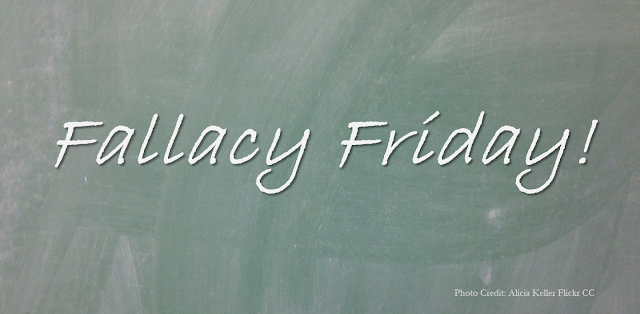(Argumentum ad Misericordiam, Playing to Emotions, Appeal to Pity, "E" for Effort, Noble Effort, Sob Story)
This fallacy occurs when someone attempts to invoke an emotional response (fear, hope, anxiety, love, surprise, guilt, shame, distress, interest, excitement, joy, anger, disgust sadness, happiness, amusement, peacefulness) instead of using a valid or compelling argument. It’s a fallacy because it’s using emotion instead of logic to make its argument. Almost all humans are affected by emotion, and that makes these appeals exceptionally common and effective (think “scare tactics”). However, they are flawed and dishonest. They also tend to unjustly trigger an emotional response from the opponent. It is important to note that emotional responses may accompany otherwise logical arguments without making them fallacies. Appeals to emotion are often the basis for censorship and bigotry.
Friday, October 30, 2015
Friday, October 23, 2015
Today's Logical Fallacy is... Appeal to Authority!
(Argument from Authority, type of Ad Hominem)
A type of ad hominem, this fallacy occurs when one believes what an authority figure says just because they are an authority figure. In other words, the claim is true because of the identity of the person advancing the claim, often regardless of their knowledge of field, an established consensus, or any biases. The converse of this fallacy is the credential fallacy: rejecting a claim because the individual suggesting it doesn’t have the right authority or degrees.
A type of ad hominem, this fallacy occurs when one believes what an authority figure says just because they are an authority figure. In other words, the claim is true because of the identity of the person advancing the claim, often regardless of their knowledge of field, an established consensus, or any biases. The converse of this fallacy is the credential fallacy: rejecting a claim because the individual suggesting it doesn’t have the right authority or degrees.
Friday, October 16, 2015
Today's Logical Fallacy is...Argument from Inertia!
(Stay the Course)
This fallacy occurs when someone argues that we must continue on a course of action even though it has been proven to be a mistake. A variety of the argument from consequences, they defend “staying the course” because changing course would require admitting that they made a wrong decision – which might undermine the authority of the one making the decisions – or would take considerable money, effort, and/or resources in order to change. This fallacy can also be an appeal to tradition if long-standing customs are a part of the argument: “I don't care if the recipe is unhealthy. We’ve always done it this way, so we’re going to continue to do it.”
This fallacy occurs when someone argues that we must continue on a course of action even though it has been proven to be a mistake. A variety of the argument from consequences, they defend “staying the course” because changing course would require admitting that they made a wrong decision – which might undermine the authority of the one making the decisions – or would take considerable money, effort, and/or resources in order to change. This fallacy can also be an appeal to tradition if long-standing customs are a part of the argument: “I don't care if the recipe is unhealthy. We’ve always done it this way, so we’re going to continue to do it.”
Friday, October 9, 2015
Today's Logical Fallacy is... False Dichotomy!
(False Dilemma, Black/White Fallacy, Either-Or Reasoning, Fallacy of False Choice, Fallacy of Exhaustive Hypotheses, Fallacy of False Alternative, Fallacy of the Excluded Middle)
Closely related to the straw man fallacy, this occurs when choices are artificially reduced to only two options, ignoring all other alternatives, either intentionally or unintentionally. It implies that there really is only a choice between two extremes with no room for compromise, and it is usually worded in such a way to favor one answer over the other. Not only is this fallacy misleading and dishonest, it impedes rational discussion.
Closely related to the straw man fallacy, this occurs when choices are artificially reduced to only two options, ignoring all other alternatives, either intentionally or unintentionally. It implies that there really is only a choice between two extremes with no room for compromise, and it is usually worded in such a way to favor one answer over the other. Not only is this fallacy misleading and dishonest, it impedes rational discussion.
Friday, October 2, 2015
Today's Logical Fallacy is... Overgeneralization!
(Hasty Generalization, Fallacy of Exclusion, Faulty Sign, Hasty Conclusion, Jumping to a Conclusion, Misunderstanding Statistics or Non-Representative Sample, Composition/Division, Sweeping Generalization).
A type of association fallacy, this occurs when you draw a conclusion without sufficient evidence, often using one or two examples as a basis of judgment for all examples. It is frequently applied to group behavior in assuming that the behavior displayed by some is indicative or unique to that entire group when it is actually common to many groups. A small incidence is mistaken for a larger trend.
A type of association fallacy, this occurs when you draw a conclusion without sufficient evidence, often using one or two examples as a basis of judgment for all examples. It is frequently applied to group behavior in assuming that the behavior displayed by some is indicative or unique to that entire group when it is actually common to many groups. A small incidence is mistaken for a larger trend.
Subscribe to:
Comments (Atom)

